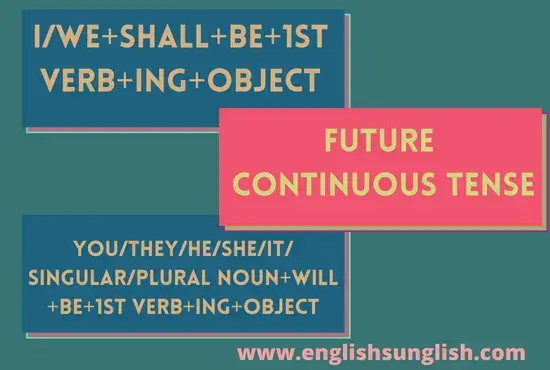Present Perfect Continuous Tense|Definition, rules, Formula, Examples
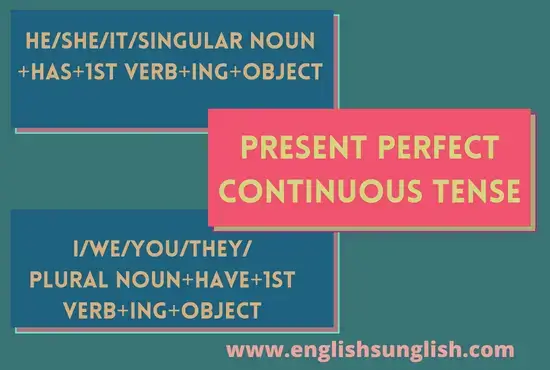
When the Verb of a sentence shows an action that started in the past period but has not been completed yet, at the time of speaking, then this Verb is indicated as the Present Perfect Continuous Tense. It means that “Present Perfect Continuous Tense” shows an action that is going on for a long period and has not been completed at the time of speaking. For example:
- I have been speaking.
- You have been speaking.
- He has been speaking.
- We have been speaking.
- They have been speaking.
- It has been raining all night.
Helping Verb of Present Perfect Continuous Tense
Present Perfect Continuous Tense uses “has been” or “have been ” as helping verbs with the addition of “ing” to the 1st form of the Verb. “Has” and “have” are used to show that some action started in the past period and “being” is used with the 1st form of the Verb with the addition of “ing” to show the continuity of the action.
“Has been” as Helping Verb in the Present Perfect Continuous Tense
“Has been” is used as a helping verb in Present Perfect Continuous Tense with 3rd person pronouns “he, she, it”, and with singular number nouns. 1st form of the Verb is used with the addition of “ing” to show the continuity of the actions or states in the present period.

“Have been” as Helping Verb in the Present Perfect Continuous Tense
“Have been” is used as a helping verb in Present Perfect Continuous Tense with 1st and 2nd person pronouns “I, you”, plural person pronouns “they, we” and with plural number nouns. In addition, 1st form of the Verb must be used with the addition of “ing” to show the continuity of the action or state.

Sentence Structure of Present Perfect Continuous Tense
Present Perfect Continuous Tense uses “has been” or “have been” as a helping verb with their respective personal pronouns and number nouns to describe the actions of states that have been started in the past periods, but are continuing in the present periods.
Following are the main sentence structures of the Assertive, Negative, Interrogative, and Negative-Interrogative Sentences of the Present Perfect Continuous Tense.
Assertive Sentence Structure of Present Perfect Continuous Tense
Assertive Sentences of the Present Perfect Continuous Tense use “has been” and “have been” with “1st form of Verb+ing”, to show the beginning of the action in the past and the continuity of the same action in the present period.
“Has been” can be used in Present Perfect Continuous Tense with singular 3rd person pronouns “he, she, it” and with singular number nouns. So, Present Perfect Continuous Tense has the following subject, verb, and object agreement with the 1st form of Verb and “ing”.
Subject+ has been+ 1st form of Verb+ ing+ Object+ since/for + Remaining Words
“Have been” is used in Present Perfect Continuous Tense with singular 1st and 2nd person pronouns “I, you”, plural person pronouns “we, they”, and with plural number nouns. The sentences of Present Perfect Continuous Tense with the helping verb “have been”, have the following sentence structure:
Subject+ have been+ 1st form of Verb+ ing+ Object+ for/since+ Remaining Words
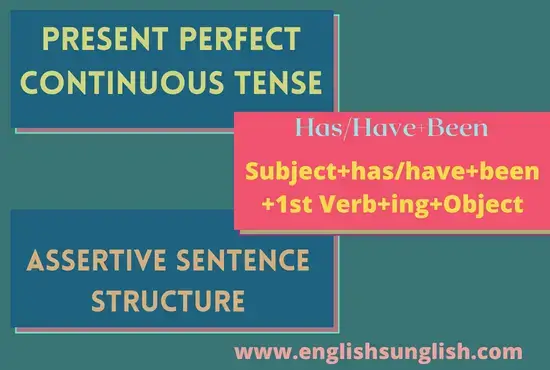
Examples of Assertive Sentences of Present Perfect Continuous Tense
Following are some examples of the Assertive Sentences of Present Perfect Continuous Tense.
Has been
“Has been” is used with singular number nouns and with singular 3rd person pronouns “he, she, it”. So, the sentence structure of the Present Perfect Continuous Tense can be summarized as:
- He has been reading in this school for two years.
- He has been coming here for a long.
- The child has been weeping for two hours.
- The girl has been taking medicine for three days.
- The student has been working hard for four months.
- The teacher has been teaching since 8’O clock.
- John has been taking a bath for fifteen minutes.
- He has been living in this house since 1990.
- The miser has been saving every penny for five years.
- He has been flying kite since noon.
- Akbar has been learning tables for several hours.
- The patient has been crying for ten minutes.
- The doctor has been examining the patient for two hours.
- The watchman has been keeping watch for five hours.
- The farmer has been harvesting crops for two months.
- He has been getting a pension since 1983.
Have been
Plural Number Nouns, plural person pronouns “We, they”, and 1st and 2nd singular person pronouns “I, you” use “have been”, with the addition of “ing” to 1st form of the Verb. Following is the general sentence structure of the Present Perfect Continuous Tense with “have been”:
- We have been singing this song.
- You have been waiting for him for two hours.
- People have been coming to the park since morning.
- The players have been playing football since 4O clock.
- The girls have been coming to college for two years.
- We have been waiting for you for several hours.
- People have been gathering to receive the president since evening.
- All the friends have been traveling together since Wednesday.
- We have been preparing to go back since yesterday.
- You have been writing letters to your friends since 6O clock.
- You have been sharpening the knife for five minutes.
- The draftsmen have been drawing the map of the building for one week.
- The players have been making preparations to play a match for several days.
- I have been repairing the television set since Wednesday.
- Some people have been enjoying the exhibition since evening.
- All the people have been embracing one another for an hour.
- The girls have been making garlands since 7’O clock.
- All Muslims have been fasting since the first of Ramazan.
Negative Sentence Structure of Present Perfect Continuous Tense
Negative Sentences of Present Perfect Continuous Tense with singular number nouns and singular 3rd person pronouns “he/she/it”, use “has not been” to show the negativity of the sentence, and have the following sentence structure.
Negative sentences of Present Perfect Continuous Tense with plural number nouns, plural person pronouns “we, they”, and 1st and 2nd person pronouns “I, you”, take “have not been” with 1st form of Verb and “ing”, to show the negativity of the sentences. Following is the subject, verb, and object agreement for negative sentences of Present Perfect Continuous Tense with “have been”.
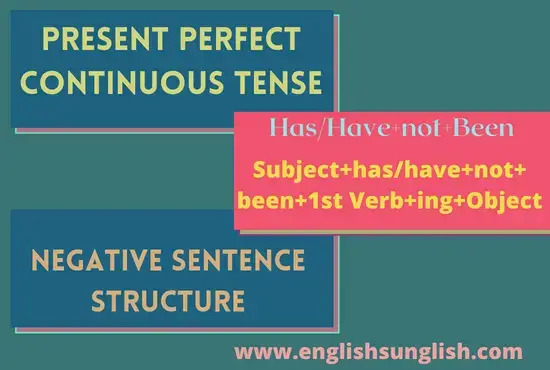
Examples of Negative Sentences of Present Perfect Continuous Tense
Following are some examples of Negative Sentences of Present Perfect Continuous Tense:
Has+not+been
“Has not been” is used with negative sentences of Present Perfect Continuous Tense that have singular 3rd person pronouns “he/she/it” and with singular number nouns. The Negative Sentences with “has not been”, have the following subject, verb, and object agreement.
- He has not been taking exercise for two days.
- The tailor has not been sewing clothes since Tuesday.
- The hunter has not been setting a net for several months.
- He has not been giving anything to his mother for four months.
- It has not been raining in Lahore since yesterday.
- The man has not been mowing grass since morning.
- The farmer has not been buying a new tractor for several months.
- Asghar has not been telling a lie for twenty days.
- Our cow has not been yielding milk since Monday.
- The cock has not been crowing since yesterday.
- The ox has not been eating fodder for two days.
- His brother has not been offering prayers for four days.
- The patient has not been taking medicine for two days.
- The lion has not been attacking the cattle since Monday.
Have+not+been
Negative Sentences that have plural person pronouns “They, we”, plural number nouns, and 1st and 2nd singular person pronouns as subjects, use “have not been” to show the negativity of the sentences of Present Perfect Continuous Tense. Following is the main sentence structure of Negative Sentences of Present Perfect Continuous Tense.
- The boatmen have not been leaving their boats for two hours.
- The passengers have not been burning fire since evening.
- The idle students have not been working for many days.
- These boys have not been making mischief for three days.
- The police have not been patrolling the city since Monday.
- They have not been advising us for fifteen days.
- You have not been acting upon the advice of your parents for several years.
- The doctors have not been treating the patients for three days.
- I have not been receiving letters from my brother since October.
- The two friends have not been meeting each other since March.
- People have not been mourning the death of the robber since yesterday.
- The frogs have not been croaking in the pond since evening.
- We have not been believing in rumors since April.
- I have not been writing a new novel since December.
- My friends have not been sending gifts for several years.
- The hens have not been laying eggs since June.
Interrogative Sentence Structure of Present Perfect Continuous Tense
Interrogative Sentences of Present Perfect Continuous Tense with Word of Question “what/where/why/when/how; etc”, use either “have” or “have” after “Word of Question”, according to the type of the subject. Such Interrogative Sentences with Word of Question have the following subject, verb, and object agreement.
The Interrogative Sentences of Present Perfect Continuous Tense that have singular 3rd person pronouns “he/she/it”, and singular number nouns, use “has” at the start of the interrogative sentences to ask a question. And “been” comes after the subjects of the sentences to show the continuity of the action, with the addition of “ing” to the 1st form of the Verb. The Interrogative Sentence Structure with “has been”, can be defined as:
Plural Number Nouns, plural person pronouns “We, they”, and singular 1st and 2nd person pronouns “I, you”, use “have” at the start of interrogative sentences to make a question. Interrogative Sentences of Present Perfect Continuous Tense with “have” have the following sentence structure.
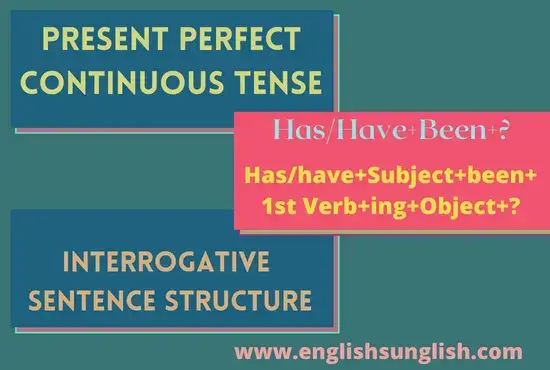
Examples of Interrogative Sentences of Present Perfect Continuous Tense
Following are some examples of Interrogative Sentences of Present Perfect Continuous Tense.
Word of Question+has/have+been+?
Interrogative Sentences of Present Perfect Continuous Tense with Word of Question use “has/have” as a helping verb after them, and have the following general Interrogative Sentence Structure.
- Since when has the rich man been taking a rest?
- Where has the carpenter been repairing chairs since Friday?
- Why has Saeed been taking medicine for three days?
- Where have they been sawing wood since noon?
- Since when have the naughty boys been deflating the tube?
- What have you been doing here for four hours?
- Which story has John been writing since 7’O clock?
- Whose shirt has Marry been sewing since Monday?
- Why have the children been spoiling books since morning?
- In which factory has my brother been working since the 11th instant?
- Where have the laborers been working for five hours?
- Which road has the road roller been repairing for two days?
- Since when has the gardener been planting new trees?
- Why have the shopkeepers been decorating shops for three days?
Has been+?
“Has” is used to ask questions in Interrogative Sentences of Present Perfect Continuous Tense that have singular number nouns and singular 3rd person pronouns “he/she/it”. Interrogative Sentences of Present Perfect Continuous Tense with “has”, have the following Sentence Structure.
- Has the child been playing with toys since 2’O clock?
- Has the master been punishing his servant since 7’O clock?
- Has it been raining since evening?
- Has the crowd been raising slogans since noon?
- Has he been reading a novel for twenty minutes?
- Has the child been playing with toys since morning?
- Has the patient been taking a bath for four days?
- Has he been advising you for two months?
- Has the watchman been keeping watch for five hours?
- Has the farmer been harvesting crops for two months?
- Has he been getting a pension since 1983?
- Has John been taking a bath for fifteen minutes?
- Has he been living in this house since 1990?
- Has the miser been saving every penny for five years?
- Has he been flying kite since noon?
- Has Akbar been learning tables for several hours?
- Has the patient been crying for ten minutes?
- Has the doctor been examining the patient for two hours?
Have been+?
“Have” is used in Interrogative Sentences with plural number nouns, plural pronouns “We, they”, and 1st and 2nd singular person pronouns “I, you”. Interrogative Sentences with “have” have the following subject, verb, and object agreement.
- Have the flies been buzzing over rotten fruits for two hours?
- Have players been inflating football for ten minutes?
- Have the guests been waiting for food for one hour?
- Have the cattle been drinking water at this pond for two months?
- Have your friends been helping you since October?
- Have the musicians been singing songs since Tuesday?
- Have all the friends been traveling together since Wednesday?
- Have we been preparing to go back since yesterday?
- Have you been writing letters to your friends since 6O clock?
- Have you been sharpening the knife for five minutes?
- Have the draftsmen been drawing the map of the building for one week?
- Have the players been making preparations to play a match for several days?
- Have I been repairing the television set since Wednesday?
- Have some people been enjoying the exhibition since evening?
- Have all the people been embracing one another for an hour?
- Have the girls been making garlands since 7’O clock?
Negative Interrogative Sentence Structure of Present Perfect Continuous Tense
Negative Interrogative Sentences of Present Perfect Continuous Tense with Word of Question “what/where/why/when/how; etc”, use either “have” or “have” after “Word of Question”, and “not been” comes after the subject of the Negative Interrogative Sentences to show the negativity of the interrogative sentences. Such Negative Interrogative Sentences with Word of Question have the following subject, verb, and object agreement.
Negative Interrogative Sentences of Present Perfect Continuous Tense that have singular 3rd person pronouns “he/she/it”, and singular number nouns, use “has” at the start of the negative interrogative sentences to ask a question. And “not been” comes after the subject of the sentence to show the continuity and negativity of the action, with the addition of “ing” to the 1st form of the Verb. Negative Interrogative Sentence Structure with “has been”, can be defined as:
Plural Number Nouns, plural person pronouns “We, they”, and singular 1st and 2nd person pronouns “I, you”, use “have” at the start of negative interrogative sentences, and “not been” comes after the subject of the sentence to make negative questions. Negative Interrogative Sentences of Present Perfect Continuous Tense with “have” have the following sentence structure.

Examples of Interrogative Sentences of Present Perfect Continuous Tense
Following are some examples of Negative Interrogative Sentences of Present Perfect Continuous Tense.
Word of Question+has/have+not+been+?
Negative Interrogative Sentences of Present Perfect Continuous Tense with Word of Question use “has/have” as a helping verb after them, and have the following general Interrogative Sentence Structure.
- Since when not has the rich man been taking a rest?
- Why has the carpenter not been repairing chairs since Friday?
- Why has Saeed not been taking medicine for three days?
- Why have they not been sawing wood since noon?
- Since when have the naughty boys not been deflating the tube?
- What have you not been doing here for four hours?
- Which story has John not been writing since 7’O clock?
- Whose shirt has Marry not been sewing since Monday?
- Why have the children not been taking rest since morning?
- In which factory has my brother not been working?
- Where have the laborers not been working for five hours?
- Which road has the road roller not been repaired for two days?
- Since when has the gardener not been planting new trees?
- Why has the shopkeeper not been decorating shops for three days?
Has+not+been+?
“Has” is used to ask questions in Negative Interrogative Sentences of Present Perfect Continuous Tense that have singular number nouns and singular 3rd person pronouns “he/she/it”. Negative Interrogative Sentences of Present Perfect Continuous Tense with “has”, have the following Sentence Structure.
- Has the child not been playing with toys since 2’O clock?
- Has the master not been punishing his servant since 7’O clock?
- Has it not been raining since evening?
- Has the crowd not been raising slogans since noon?
- Has he not been reading a novel for twenty minutes?
- Has the child not been playing with toys since morning?
- Has the patient not been taking a bath for four days?
- Has he not been advising you for two months?
- Has the watchman not been keeping watch for five hours?
- Has the farmer not been harvesting crops for two months?
- Has he not been getting a pension since 1983?
- Has John not been taking a bath for fifteen minutes?
- Has he not been living in this house since 1990?
- Has the miser not been saving every penny for five years?
- Has he not been flying kite since noon?
- Has Akbar not been learning tables for several hours?
- Has the patient not been crying for ten minutes?
- Has the doctor not been examining the patient for two hours?
Have+not+been+?
“Have” is used in Negative Interrogative Sentences with plural number nouns, plural pronouns “We, they”, and 1st and 2nd singular person pronouns “I, you”, and “not been” comes after the subject of the sentence to show the negativity of interrogative sentences. Negative Interrogative Sentences with “have” have the following subject, verb, and object agreement.
- Have the flies not been buzzing over rotten fruits for two hours?
- Have players not been inflating football for ten minutes?
- Have the guests not been waiting for food for one hour?
- Have the cattle not been drinking water at this pond for two months?
- Have your friends not been helping you since October?
- Have the musicians not been singing songs since Tuesday?
- Have all the friends not been traveling together since Wednesday?
- Have we not been preparing to go back since yesterday?
- Have you not been writing letters to your friends since 6O clock?
- Have you not been sharpening the knife for five minutes?
- Have the draftsmen not been drawing the map of the building for one week?
- Have the players not been making preparations to play a match for several days?
- Have I not been repairing the television set since Wednesday?
- Have some people not been enjoying the exhibition since evening?
- Have all the people not been embracing one another for an hour?
- Have the girls not been making garlands since 7’O clock?
Passive Voice of Present Perfect Continuous Tense
The Active Voice of the Present Perfect Continuous Tense can not be converted into the Passive Voice form, because any Perfect Continuous Tense emphasizes the continuous actions that have been taking place for a long and no one can be predicted when they have to end.
